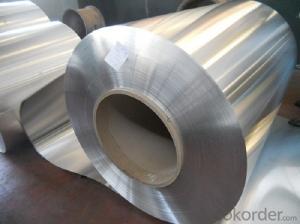8011 HO Aluminum Coil for Wine/ Medicine PP Cap
- Loading Port:
- Shanghai
- Payment Terms:
- TT OR LC
- Min Order Qty:
- 2.5
- Supply Capability:
- 5000 m.t./month
OKorder Service Pledge
OKorder Financial Service
You Might Also Like
Item specifice
8011 HO Aluminum Coil for Wine/ Medicine PP Cap
l Product Introduction
We offer 8011, 3105, 3003, 3005 HO, H14, H16, H18 aluminium coil for lids (caps) crystal segment is uniform, which makes its deep stamping property excellence. These products are widely used in Wine bottles, Pilfer-proof caps, ROPP cap, Pharmceutical cap, etc.
l Product Specification
1. Alloy: 8011, 3105, 3005, 3003
2. Temper: HO, H14, H24, H16, H26,H18
3. Pattern: rolled, degreased, pre-lubricated, pre-treated, lacquered
4. Thickness: 0.19-0.3 (0.23/0.22/0.27) mm
5. Width: 500-1200 (829/880/1085) mm
6. Length: as requirement, or in coil
7. Coil ID: 75, 150, 300, 500, etc
8. Payment Terms: 30% by TT in advance as deposit and the rest payment upon delivery or irrevocable, confirmed L/C at sight;
9. Lead Time: about 15~30 days after deposit
l Packaging & Delivery
Packaging detail: Seaworthy Export Standard Wooden Pallet and with damp proof film as first layer, Kraft paper as second layer, Cardboard card as third layer Criss-cross steel strip to fix outside
Delivery detail: About 25 days
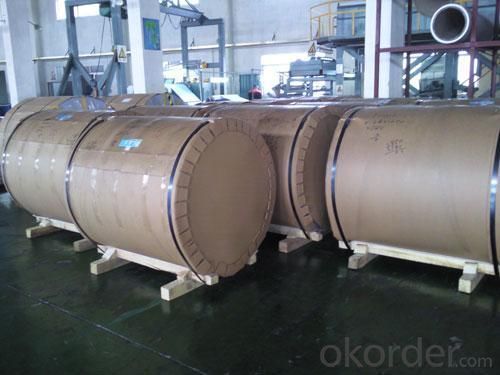
l Company Profile
CNBM International Corporation, China National Building Materials (Group) Corporation, is one of the largest companies in China building material & equipment industry, with 42,800 employees and sales in 2005 of US Dollar 4.395 billion. In 2006, China National Building Material Company Limited was listed on Hong Kong Stock Market with the stock code as 3323. |
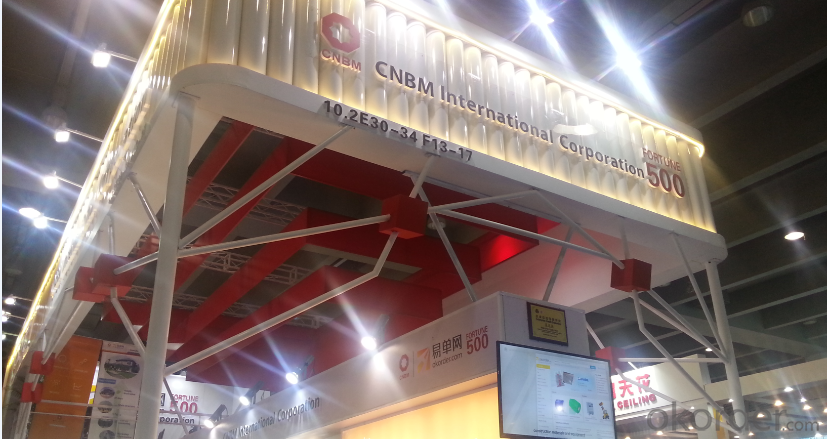
l CNBM World Wide
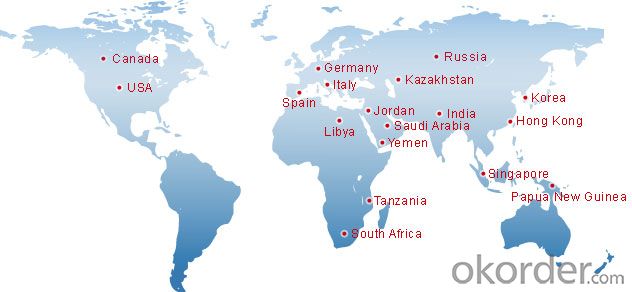
l Products Images
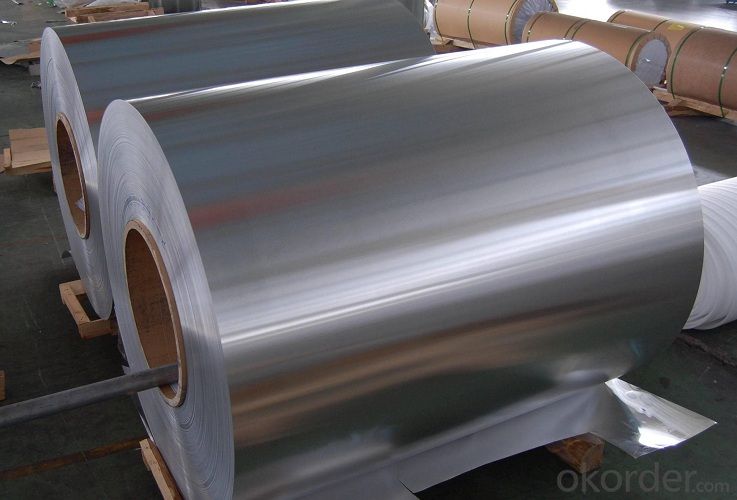
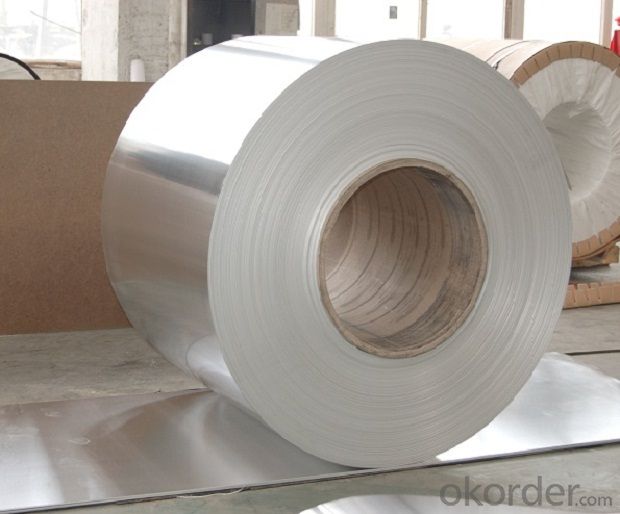
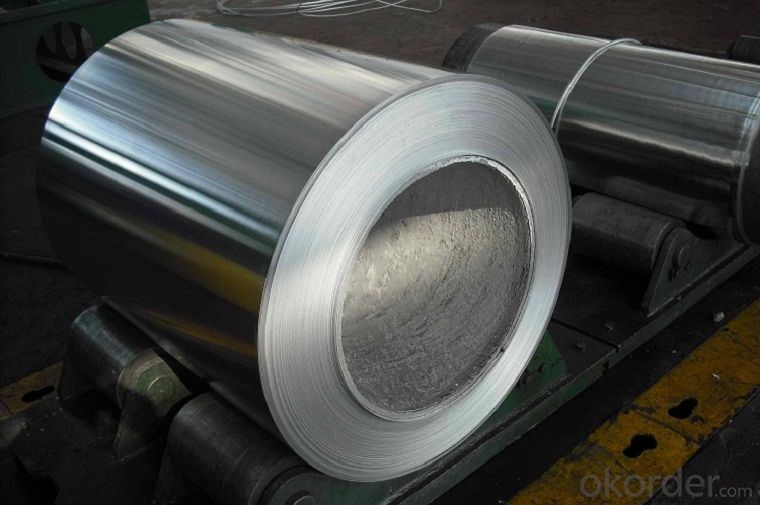
l Certificates
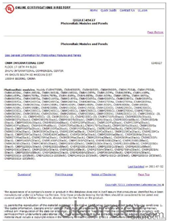
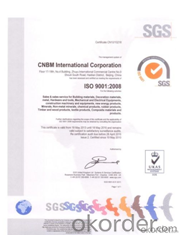
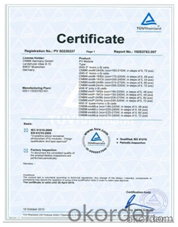
l FAQ
Q: Do you provide free samples?
A: Yes, free samples will be sent to you on freight at destination.
Q: Can I get your latest products catalogue?
A: Yes, it will be sent to you in no time.
Q: What is the MOQ?
A: 2.5 tons
Q: What are your payment terms?
A: We accept L/C, T/T
- Q:Can aluminum coils be used in the production of heat sinks?
- Yes, aluminum coils can be used in the production of heat sinks. Aluminum has excellent thermal conductivity, making it an ideal material for heat dissipation. Coiling the aluminum into a specific shape allows for increased surface area, enhancing the heat transfer capabilities of the heat sink.
- Q:How do aluminum coils contribute to noise reduction in buildings?
- Aluminum coils can contribute to noise reduction in buildings through their unique properties and installation techniques. Firstly, aluminum is a highly efficient sound insulator due to its density and ability to absorb and dampen sound waves. When used as coil insulation, aluminum can effectively block and reduce airborne noise transmission, minimizing the impact of external sounds on the building's interior. In addition to the inherent sound insulation properties of aluminum, the installation of aluminum coils in buildings can further enhance noise reduction. The coils can be strategically placed in areas where noise transmission is likely to occur, such as HVAC systems and ductwork. By tightly sealing these areas with aluminum coils, any potential gaps or openings that could allow sound to travel are eliminated. Moreover, aluminum coils can also act as a barrier to vibration and resonance noises. They can be installed around mechanical equipment or structural elements prone to vibration, effectively dampening these vibrations and preventing them from propagating throughout the building. This is particularly essential in reducing low-frequency noises, which are typically more challenging to control and can significantly impact the comfort and productivity of occupants. Furthermore, aluminum coils offer durability and longevity, ensuring their effectiveness in noise reduction over an extended period. They are resistant to corrosion, moisture, and other environmental factors, maintaining their sound-insulating properties and preventing sound leakage. Overall, by combining the sound insulation properties of aluminum with strategic installation techniques, such as sealing gaps and dampening vibrations, aluminum coils play a crucial role in reducing noise transmission in buildings. Their ability to absorb, block, and dampen sound waves makes them an effective solution for creating quieter and more comfortable indoor environments.
- Q:What is the typical density of aluminum coils?
- The density of aluminum coils can differ depending on the particular alloy and manufacturing method employed. Generally, aluminum coils have a density of approximately 2.7 g/cm³. This value is slightly lower than pure aluminum, which has a density of 2.7-2.8 g/cm³. It should be noted that the density of aluminum coils can also be affected by factors such as coil thickness and any surface coatings or treatments applied.
- Q:What is the weight of aluminum coils?
- The weight of aluminum coils can differ based on their specific dimensions and thickness. Nevertheless, the average weight of aluminum coils can span from a few hundred pounds to several thousand pounds. It is crucial to consider that the weight of aluminum coils can also be affected by factors like the composition of the alloy and any extra coatings or treatments applied to them.
- Q:What are the common sizes and dimensions of aluminum coils?
- The common sizes and dimensions of aluminum coils can vary based on the specific industry and application. However, there are some commonly used dimensions that are found across various industries. In the building and construction industry, aluminum coils are often available in widths ranging from 24 inches (609.6 mm) to 60 inches (1524 mm). The thickness of these coils can range from 0.019 inches (0.48 mm) to 0.032 inches (0.81 mm), although thicker gauges may also be available for specialized applications. For the transportation industry, especially in the manufacturing of automobiles and aircraft, aluminum coils are typically wider and thicker. Widths can range from 48 inches (1219.2 mm) to 72 inches (1828.8 mm), and thicknesses can vary from 0.035 inches (0.89 mm) to 0.125 inches (3.18 mm). In the food and beverage industry, where aluminum is commonly used for packaging purposes, the dimensions of aluminum coils can be smaller. Widths can range from 12 inches (304.8 mm) to 24 inches (609.6 mm), and thicknesses are usually around 0.006 inches (0.15 mm) to 0.020 inches (0.51 mm). It is important to note that these dimensions are not exhaustive and can vary depending on the manufacturer and specific requirements of the application. Therefore, it is always recommended to consult with suppliers or manufacturers to determine the most suitable sizes and dimensions for your specific needs.
- Q:What are the potential applications of recycled aluminum coils?
- Recycled aluminum coils have various potential applications across several industries. They can be used in the manufacturing of automotive parts, such as body panels, engine components, and heat exchangers. Additionally, they can be utilized in the production of building materials like roofing, gutters, and siding due to their corrosion resistance and durability. Moreover, recycled aluminum coils are suitable for packaging purposes, including beverage cans, food containers, and aerosol cans. Their versatility and sustainability make them an excellent choice for a wide range of applications.
- Q:Can aluminum coils be used for gutter systems?
- Yes, aluminum coils can be used for gutter systems. Aluminum is a popular material for gutters due to its lightweight nature, durability, and resistance to rust and corrosion. Aluminum coils are often used to form seamless gutters, which offer advantages such as fewer leaks and a more aesthetically pleasing appearance. Additionally, aluminum gutters are easy to maintain and can be painted to match the exterior of a building. Overall, aluminum coils are a suitable and commonly used choice for gutter systems.
- Q:Can aluminum coils be used in automotive heat exchangers?
- Yes, aluminum coils can be used in automotive heat exchangers. Aluminum is a popular choice for heat exchangers in the automotive industry due to its excellent thermal conductivity, lightweight nature, and resistance to corrosion. These properties allow aluminum coils to efficiently transfer heat from one fluid or gas to another, making them ideal for use in automotive heat exchangers. Additionally, aluminum coils are also easy to manufacture and can be formed into various shapes and sizes, further enhancing their suitability for automotive applications.
- Q:What are the different coil handling methods for aluminum coils?
- There are several different coil handling methods for aluminum coils, each designed to ensure safe and efficient handling and storage of these valuable materials. 1. Manual Handling: This method involves using manual labor to physically lift and move the aluminum coils. It requires proper training and the use of personal protective equipment to avoid injury. Manual handling is suitable for smaller coils or when equipment is not available. 2. Forklift Handling: Forklifts are commonly used for handling aluminum coils. They are equipped with specially designed coil lifters or C-hooks to securely lift and transport the coils. Forklifts provide a more efficient and faster method for handling larger and heavier coils. 3. Coil Lifters: Coil lifters are specialized lifting devices that are designed specifically for handling aluminum coils. These lifters use a combination of clamps and hooks to securely grip the coil during lifting and transport. They are often used in conjunction with cranes or forklifts. 4. C-Hooks: C-hooks are another common method for handling aluminum coils. These hooks are attached to cranes or other lifting equipment and are designed to cradle the coil securely. C-hooks allow for easy and controlled movement of the coil, and they are suitable for both small and large coils. 5. Coil Tippers: Coil tippers are used to tilt the coils horizontally or vertically for easier loading or unloading. This method helps to reduce the risk of damage to the coils during handling and improves efficiency by allowing coils to be easily placed on or removed from racks or pallets. 6. Coil Carriers: Coil carriers are specialized trailers or trucks designed to transport aluminum coils. They have built-in coil cradles or beds that securely hold the coils during transportation. These carriers often have adjustable supports to accommodate different coil sizes and prevent shifting during transit. Overall, the choice of coil handling method depends on the size, weight, and specific requirements of the aluminum coils. It is important to use the appropriate handling method to ensure the safety of workers, prevent damage to the coils, and maintain the quality of the aluminum.
- Q:Are aluminum coils resistant to UV rays?
- Generally, aluminum coils possess resistance against UV rays. Aluminum, being a non-reactive metal, does not easily corrode or react with other substances. This resistance to corrosion also extends to UV rays. UV rays are a type of radiation emitted by the sun and can cause gradual damage to various materials, including fading, discoloration, and degradation. However, aluminum is renowned for its ability to withstand UV rays without significant harm. Hence, aluminum coils are an appropriate option for outdoor applications that involve exposure to sunlight and UV rays, such as air conditioning systems, refrigeration units, and solar panels. Furthermore, aluminum coils can be coated with protective finishes or paints to further enhance their resistance to UV rays and prolong their lifespan.
1. Manufacturer Overview |
|
|---|---|
| Location | |
| Year Established | |
| Annual Output Value | |
| Main Markets | |
| Company Certifications | |
2. Manufacturer Certificates |
|
|---|---|
| a) Certification Name | |
| Range | |
| Reference | |
| Validity Period | |
3. Manufacturer Capability |
|
|---|---|
| a)Trade Capacity | |
| Nearest Port | |
| Export Percentage | |
| No.of Employees in Trade Department | |
| Language Spoken: | |
| b)Factory Information | |
| Factory Size: | |
| No. of Production Lines | |
| Contract Manufacturing | |
| Product Price Range | |
Send your message to us
8011 HO Aluminum Coil for Wine/ Medicine PP Cap
- Loading Port:
- Shanghai
- Payment Terms:
- TT OR LC
- Min Order Qty:
- 2.5
- Supply Capability:
- 5000 m.t./month
OKorder Service Pledge
OKorder Financial Service
Similar products
New products
Hot products
Related keywords
